- Home
- Brandon Sanderson
Infinity Blade: Redemption Page 6
Infinity Blade: Redemption Read online
Page 6
He throws away so much just to hinder me, Raidriar thought. I should be flattered.
He was not. The move did not make sense; the Worker couldn’t have known Raidriar would escape. What was happening here . . . it was insanity.
But the Worker was not insane. He was clever, subtle, and brilliant. Raidriar’s confusion meant that the Worker’s plots were beyond him. Raidriar was too far behind to even grasp what his enemy was doing.
That terrified him.
He checked on a few more items—including his secret kingdom to the south, where he was called by different names. Excellent. That seemed to be untouched. If all went very poorly, he could travel there and rebuild.
He would rather not. It would mean abandoning this empire, admitting defeat, and allowing the Worker to drive this realm into the ground.
Raidriar memorized what he felt he would need from the information, then set the machine to wipe itself. He took his Devoted from this holy hub, stepping out as the spiderlike keepers began to deactivate and drop from walls and wires. They clicked against the ground like falling coins.
He walked from the temple structure toward the sunlight, traveling down a long tunnel that would open onto the plains beyond. How could he reclaim his empire? He would need resources, allies. Unfortunately, going to the other Deathless would be dangerous. They would see him as weak. Beyond that, he wasn’t certain any of them would be all that useful against the Worker. The creature would have them all in hand, and would have prepared for Raidriar to try turning them.
Raidriar needed to do something more unexpected than that—
Thump.
He stopped, looking up out of the metallic tunnel. Something blocked the sunlit sky just outside, casting an enormous shadow. A four-legged monster with tattered wings—half machine, half rotting flesh. No artistry to it at all.
Raidriar sneered. At least he now knew why there had been no further resistance. The Worker had sent this beast. It meant that Raidriar’s escape had indeed been noted, and his edge—if he’d ever had one—was no more.
Bother.
The beast smashed a limb down, crushing the tunnel opening. Raidriar rolled free, weapons out. He heard a pathetic scream from behind. The two Devoted being crushed. Raidriar growled, launching himself forward, trying to get beneath the beast’s four stubby legs. Monsters like this had trouble if you could get underneath them . . .
A large mouth gaped on the bottom of the beast’s body, full of fangs and dripping drool. Now that was just plain wrong. The beast lurched downward, trying to shove him into the maw. Raidriar dodged away. The thing left chunks of decaying flesh on the ground where it scraped and smashed.
“At least,” Raidriar said, “send something of beauty to try to kill me!”
This was an insult—and knowing the Worker, a deliberate one. In addition, there were likely traps set up at other rebirthing chambers. If Raidriar died here, when he awoke . . .
He’d just have to avoid being killed. Raidriar growled as the thing snapped at him with its proper mouth—not the one on its underside, but the one at the end of its long neck. The creature looked like a dragon out of fanciful mythology—some of the Deathless were positively neurotic about creating such things. Only its skin was more leathery than scaled, and along with its long, clawed hands it had four trunklike legs. They’d probably used an elephant as a base, grafting on wings, clawed forearms, and a sinuous neck.
Honestly. Q.I.P. mutants and creations were supposed to make sense, supposed to look dangerous and deadly—not horrifying and monstrous. There was a difference.
As the abomination swiped a clawed hand at him, Raidriar twisted his sword deftly and sheared free a few of the clawed fingers. The machine part of the beast—a large section of its back that leaked ichor—glowed with lights, and the beast screeched in anger. Raidriar dodged another snapping hand.
The head is a distraction, he thought. It’s kept alive by machinery, not by a brain. A kind of undeath.
Raidriar sheathed one sword, then reached into his pouch and fished out the teleportation ring. Then, he raised his blade and dashed at the beast.
“I am not some peasant to be toyed with!” Raidriar shouted.
He dodged under the creature’s inevitable swing, then leaped, slamming his sword into the beast’s leathery side. He used that handhold to heave, pulling himself upward to scramble onto the monster’s back.
Here, he whipped out his other sword. The thing lurched.
“I am not an irritation!” Raidriar rammed his second blade into the monster’s back, using that for a handhold as the thing thrashed and lurched. It smelled awful.
“I am a God,” he shouted, rolling across the beast’s back and slapping the key of the teleportation ring against the machinery keeping the monster alive.
It thrashed again, throwing him free. He slammed to the ground nearby with a grunt, ribs cracking. He rolled over, then took the second half of the teleportation ring and hurled it while activating its summoning property.
The machinery vanished from the beast’s back in a flash of light, then it appeared nearby, teleported to the thrown ring. Only non-living matter could travel with the ring, after all.
The monster dropped with a thump, ichor spilling from the hole.
Raidriar groaned, rolling to his knees. That was the problem with these terrible hybrids. Not organic enough to be considered fully alive, but not machine enough to have proper shielding. He lurched to his feet and walked to the machinery that he had teleported, a lump of metal and wires about the size of a small table. He found the lens, through which he knew the Worker would be watching.
“These are my lands,” Raidriar hissed, leaning in. “And these are my people. Remember that, Worker. You do not take what is mine.”
He picked up a rock and smashed the lens with a swift motion.
CHAPTER
TEN
THIS, SIRIS thought, holding up the next sheet of paper, does not make sense.
Isa was right. The brutality in the God King’s lands was astonishing. Raidriar’s empire was declining rapidly. Barely any coordination between its pieces, local minor Deathless taking up dominion of their little fiefdoms and ignoring decrees from the fake God King, villages starving because shipping had broken down.
He could have fixed this easily, Siris thought, turning to the next report. It’s like he doesn’t care.
A knock sounded at the door. Siris looked up from his reports and maps. He sat in the top room of the command center. It had its own window, which he left open to the cool mountain breeze.
The newcomer was a woman in an apron and a dark grey cotton dress. Nice clothing, for a peasant. She was one of the cooks, likely someone who had run from direct Deathless employ.
“Mr. Deathless, sir?” she asked from the doorway.
“Don’t call me Deathless,” Siris said, smiling. “It’s nothing for me to be proud of. I’m Siris.”
“Siris, sir,” she said, then curtsied. She was one of several dozen who had come to him during the last few hours. Isa was sending them up, he assumed. Soldiers, grooms, the town chandler, and now a cook.
The Dark Self was furious at the interruption, but it adapted quickly. He would need the good will of his minions.
They aren’t minions, Siris told himself forcibly. Hell take him . . . the more he leaned upon the Dark Self, the more those kinds of thoughts crept into his mind.
“What can I do for you?” Siris asked.
“I just wanted to see you,” she said. “With my own eyes.” She looked at him adoringly.
The Dark Self was pleased.
“You’re really going to kill him?” the woman asked. “The God King?”
“I’ve killed him already,” Siris said. “Hundreds of times. I’m going to do something better. I’m going to free us all.”
And after that, he’d be the only remaining Deathless.
She withdrew, and Siris settled back, disturbed at the realization of how desp
erately he wanted to be the only living Deathless. How much could he trust himself? Once, he’d blamed these instincts on the Infinity Blade, assuming that it was corrupting him. The truth was far more disturbing. There was no corruption—no exterior object to blame. This was him.
The piece of him that knew how to lead, how to inspire men and make them eager to follow, was also the piece that had oppressed and destroyed.
Another sound distracted him from his reports, but this time it wasn’t someone at the door. It came from outside. Siris tried to work, but the boiling dread of the Dark Self—mixed with his frustration at the Worker’s unseen plots—kept him from being able to focus.
Instead, he rose and went to the balcony to investigate the sound—that of children playing. He stood up above, watching them for a time, then glanced at the steps going down. The balcony had its own set, of course. Isa ran this place. There would always be a back way out of any building she ordered built.
The Dark Self wanted him to get back to his studies. So, defiant, he did not.
He started down the steps instead.
ISA SHOVELED soup into her mouth, eating quickly. There was so much to do, now that Siris was actually back. So many people she needed to make sure he met, so many plans he needed to know.
She ate quickly. Little time could be spared for food, even good food like this. The rebellion ate well; she saw to that. She’d keep these people strong.
When the cook returned from upstairs, she sent the next man in line—the last one. A lanky soldier named Drel that the others looked up to. She’d found him raiding Deathless on his own, spreading stories of Siris. Now he’d get to meet the real thing.
She nodded, sending him up the steps. Before she could return to her food, however, she heard a familiar voice coming from the front of the building.
“Hereherehereherehere!” She could barely separate the words one from another. She smiled and stood as TEL scrambled into the room.
The thing—it wasn’t really a he, though she often thought of it that way—wore the shape of a rabbit. A rabbit made completely of entwined brambles, colored like dead brush. It crackled as TEL moved, hopping through the door at a bolt.
“Stop!” she snapped at the thing.
“Master has returned,” TEL said. “Master lives. Oh, this is very good. Very good.”
The brambles suddenly collapsed and a small man-shaped thing made out of wood—matching the floor—crawled out of what was left. TEL took the substance of things he touched, and changed shape at will.
She kept feeling she should be able to find a way to use that more than she did. The thing didn’t like to listen to her, however. She could barely get it to do scouting duty.
“He’s upstairs,” Isa said. “But give him time to get done with the person I just sent up.”
“How much does he remember?” TEL asked, dancing from one foot to the other, like a child needing to piss. “Is it bad, very bad?”
“I don’t know,” Isa said.
He seemed different from the man she remembered—but then again, it had been two years.
“I need to speak with him,” TEL said, moving toward the stairs. She stepped up to stop him, but hesitated as boots thumped on the steps.
“Back so quickly?” Isa asked Drel as he appeared on the steps.
“Well, he’s . . . um, not up there.”
“What?”
“He’s not up there, sir.”
She hated being called “sir.” “My Lady” was far worse, though. She was not, and had never wanted to be, a lady. Confused, Isa stalked up the steps. TEL pushed past her, scrambling up more quickly.
Siris wasn’t in his room. Isa felt a moment of panic. Had an assassin attacked?
Don’t be an idiot, she thought at herself, entering the room. He’s immortal. Who cares about assassins?
She crossed the room, and noticed the door to the balcony cracked open. TEL joined her as she stepped outside.
“So you’re saying,” Siris said from down below, “that being ‘it’ is a mark of dishonor? But if only one person can be ‘it,’ is the position not one of distinction and exclusivity?”
A child’s voice replied. “You’ve gotta chase people when you’re it.”
“And in so doing, emulate the predator,” Siris’s voice replied. “Rather than the prey. Why doesn’t everyone want to be this ‘it’? That seems the preferred mode to me.”
“If everyone wanted to be it,” another young voice said, “then the game would be stupid!”
“But—”
“Just run, mister!” another child said.
Giggling followed. TEL moved toward the steps, but Isa stooped and grabbed him. “Wait a moment,” she ordered quietly.
Amazingly, he obeyed. Isa moved to the edge of the balcony, and found Siris—immortal, Deathless, Sacrifice, and possibly the world’s greatest living swordsman—playing a game of tag with various children of camp.
Isa leaned down, crossing her arms on the balcony railing, watching. Seeing him again had raised an entire host of emotions. Hope that this thing she had begun might actually have a chance at success. Embarrassment for the way she’d treated Siris, all those months ago.
And also hatred and betrayal, deep down. Emotions she didn’t like, but which she also couldn’t control. He was Deathless.
Watching him play tag helped change some of those feelings.
He played for a long while, though eventually the children ran at the dinner announcement. Siris watched them go, wiping his brow, then turned to climb the balcony steps. Only then did he see her.
He stopped halfway up. “Oh! Um.” He looked over his shoulder at the children. “I never—”
“‘Never got to play games as a child,’” Isa said. “I know.”
“Not that I remember, anyway,” he said, climbing the steps to join her. “TEL!” he said, noticing the small creature for the first time.
Isa cocked her eye as Siris ran up. He was more excited to see the golem than he had been to see her? It was hard not to feel a little offended by that.
“Master, you’ve been reborn too many times,” TEL said. “Oh, this is bad.”
“It is bad and good, TEL,” Siris said, sighing. He reached the top of the balcony, and turned to watch the children as they ran toward the dining hall.
“Isa,” he said. “Tell me of Siris.”
“What? Yourself?”
He nodded.
“Uh . . . you’re kind of strange? You are also Deathless, and rather tall. And . . .”
“No,” he said. “Tell me of the man they think I am. Tell me what you told them, the ‘extrapolations,’ as you put them. Tell me the person I need to be.”
She collected herself, gathering her thoughts. “You want stories of Siris, do you?” she began. “Stories of the Deathless who fought for ordinary men?”
He looked to her quizzically.
“It’s how I start,” she said. “You want to hear it as they did? The stories? Well, stories I have. Too many stories. Stories like rats in the wheat, fat and glutted upon my thoughts and memories. It’s time that you heard them.”
DEVIATION
THE SEVENTH
URIEL CRADLED his son’s limp body. Rain pelted him. Tears from far above.
Adram stood to the side, a trail of blood washing from the cut on his head and streaming down his face. He raised his hands beside his head, blabbering nonsense, eyes wide.
“Jori . . . Jori . . .” Uriel whispered, shaking.
“I didn’t see him!” Adram screamed. “The rain! I couldn’t see him!”
The too-red car rested with one tire up on the curb, the other on the mangled remains of Jori’s bicycle.
“This is your fault, Uriel!” Adram bellowed into the rain. “You . . . you should have stayed at work! You were supposed to stay late! You did this! You forced this!”
“Yes. I did.” Uriel laid down the broken body. “Cause and effect.”
“Yeah . . .” Adram
said. “Cause . . . cause and effect . . .”
“No emotions,” Uriel said, rising.
Killing a man turned out to be more difficult than Uriel would have expected. Even as Uriel had Adram pinned up against the car, hands around his neck, the man fought back. Adram was wounded, dazed from the wreck, but he was still stronger than Uriel and managed to batter his way free.
As he was running away, Adram slipped on the grass, just as Uriel noticed a large wrench in the passenger seat of the man’s car. Presumably for “tweaking the engine,” as Adram always said. Uriel picked it up, hefting it, feeling its weight. It would do for fixing other problems.
As Adram scrambled to get to his feet, Uriel stepped behind him and slammed the weapon down. Heavy as the wrench felt, it still took a good five hits to break the man’s skull open.
Fortunately, the rain washed the blood away. That kept things neater. Cleaner.
CHAPTER
ELEVEN
RAIDRIAR FIDDLED with the machine parts of the abomination he’d slain. Behind him, the carcass slumped where it had fallen, mouth open, one tattered wing toward the air. Teeth had begun to fall out of the mouth with a sound like dropping pebbles. Lacking the machinery to sustain it, the thing was literally falling apart.
Raidriar pulled out some wires. This was why he’d always preferred independent organic minions, crafted through Q.I.P. mutation. The best of them could even breed true. Independent, capable of thought. That was true creation. This sloppy piece, this was nothing more than a monument to mediocrity.
Eves approached. The High Devoted bore a few new scratches on his face, but had otherwise survived the collapse of the tunnel. His nephew, however, was another matter.
“Your funeral service was properly morose, I presume,” Raidriar said, twisting two wires together.
“I commended his spirit to your care, great master,” Eves said softly. “Your wisdom was profound in letting him survive to see your return before taking him.”
Raidriar grunted, twisting the ring from his pouch into the center of the wires. He eyed the Devoted.

 Steelheart
Steelheart The Rithmatist
The Rithmatist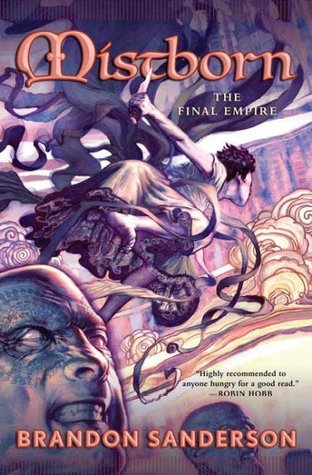 Mistborn: The Final Empire
Mistborn: The Final Empire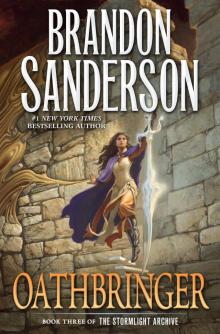 Oathbringer
Oathbringer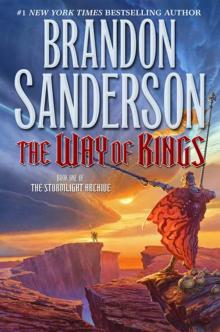 The Way of Kings
The Way of Kings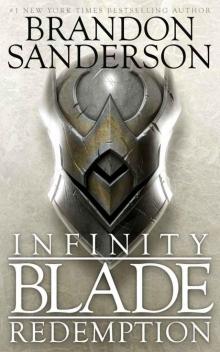 Redemption
Redemption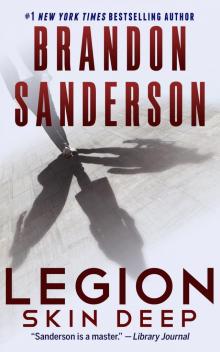 Skin Deep
Skin Deep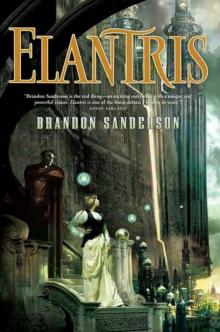 Elantris
Elantris Snapshot
Snapshot Sixth of the Dusk (Cosmere)
Sixth of the Dusk (Cosmere)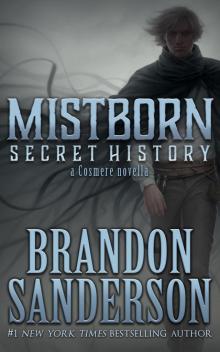 Mistborn: Secret History
Mistborn: Secret History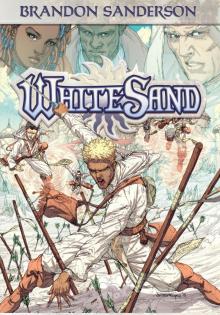 White Sand, Volume 1
White Sand, Volume 1 Legion
Legion The Well of Ascension
The Well of Ascension The Bands of Mourning
The Bands of Mourning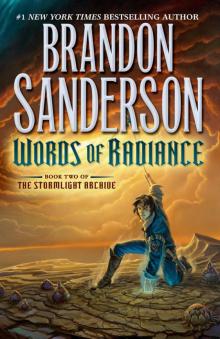 Words of Radiance
Words of Radiance The Hero of Ages
The Hero of Ages Calamity
Calamity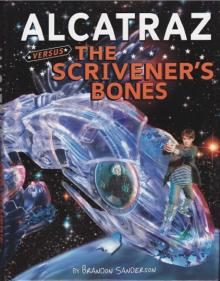 Alcatraz Versus the Scrivener's Bones
Alcatraz Versus the Scrivener's Bones The Alloy of Law
The Alloy of Law The Emperors Soul
The Emperors Soul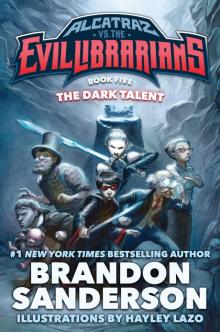 The Dark Talent
The Dark Talent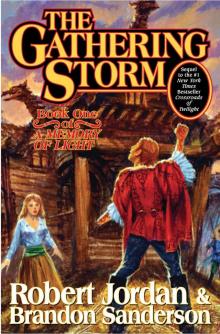 The Gathering Storm
The Gathering Storm Alcatraz Versus the Shattered Lens
Alcatraz Versus the Shattered Lens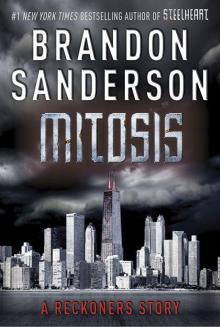 Mitosis
Mitosis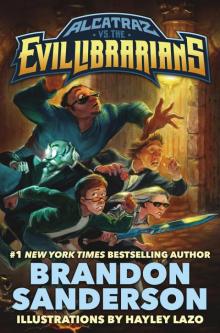 Alcatraz vs. The Evil Librarians
Alcatraz vs. The Evil Librarians Rhythm of War (9781429952040)
Rhythm of War (9781429952040)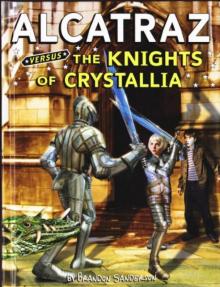 Alcatraz Versus the Knights of Crystallia
Alcatraz Versus the Knights of Crystallia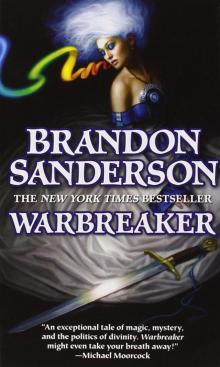 Warbreaker
Warbreaker Firstborn
Firstborn Starsight
Starsight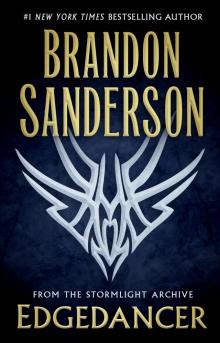 Edgedancer
Edgedancer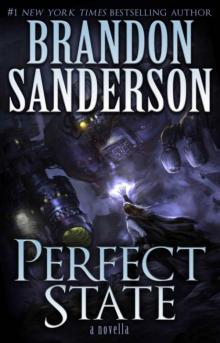 Perfect State
Perfect State Shadows of Self
Shadows of Self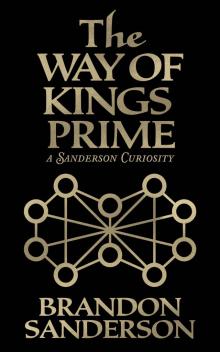 The Way of Kings Prime
The Way of Kings Prime Starsight (US)
Starsight (US) Shadows for Silence in the Forests of Hell
Shadows for Silence in the Forests of Hell Arcanum Unbounded: The Cosmere Collection
Arcanum Unbounded: The Cosmere Collection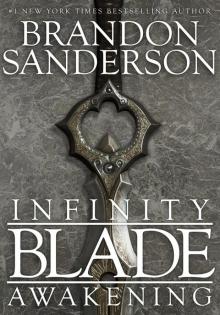 Awakening
Awakening Firefight
Firefight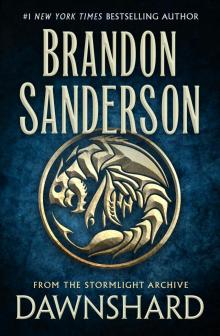 Dawnshard
Dawnshard Defending Elysium
Defending Elysium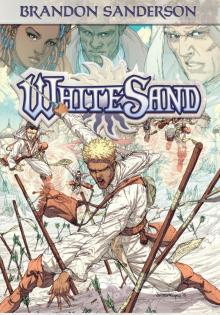 White Sand
White Sand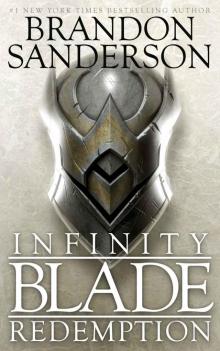 Infinity Blade: Redemption
Infinity Blade: Redemption The Final Empire
The Final Empire Skyward
Skyward Lies of the Beholder
Lies of the Beholder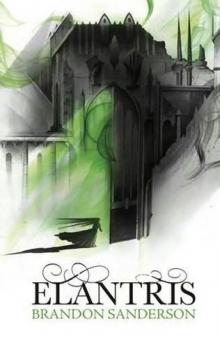 Elantris e-1
Elantris e-1 Steelheart r-1
Steelheart r-1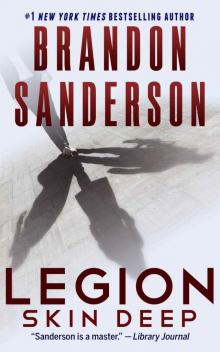 Legion: Skin Deep
Legion: Skin Deep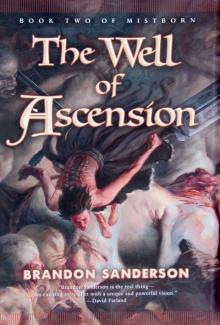 Well of Ascension
Well of Ascension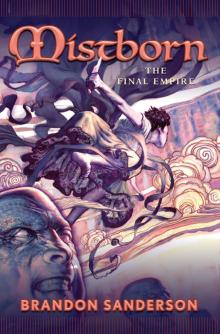 Mistborn
Mistborn Alcatraz versus the Evil Librarians
Alcatraz versus the Evil Librarians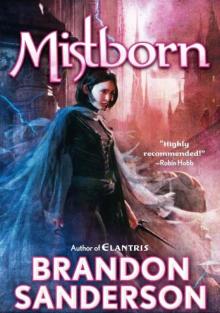 The Final Empire m-1
The Final Empire m-1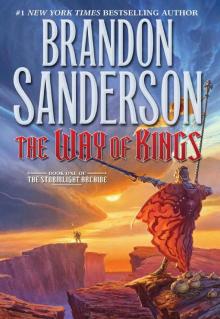 The Way of Kings (Stormlight Archive, The)
The Way of Kings (Stormlight Archive, The) Calamity (The Reckoners)
Calamity (The Reckoners) Legion and the Emperor's Soul
Legion and the Emperor's Soul Legion: The Many Lives of Stephen Leeds
Legion: The Many Lives of Stephen Leeds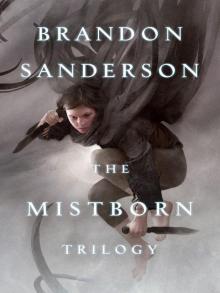 The Mistborn Trilogy
The Mistborn Trilogy Bands of Mourning
Bands of Mourning Alcatraz
Alcatraz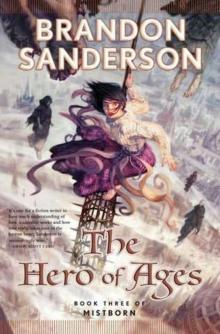 The Hero of Ages m-3
The Hero of Ages m-3 Alcatraz vs. the Shattered Lens
Alcatraz vs. the Shattered Lens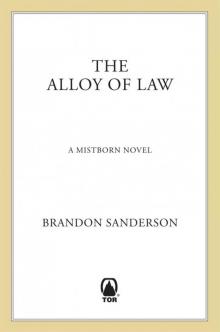 The Alloy of Law: A Mistborn Novel
The Alloy of Law: A Mistborn Novel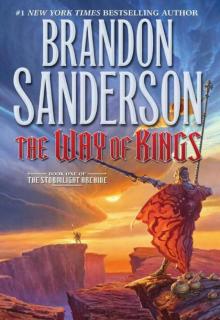 The Way of Kings sa-1
The Way of Kings sa-1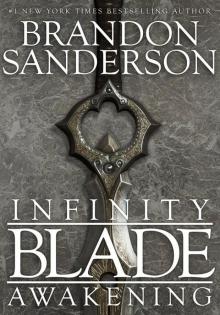 Infinity Blade: Awakening
Infinity Blade: Awakening Sixth of the Dusk
Sixth of the Dusk The Stormlight Archive
The Stormlight Archive The Aether of Night
The Aether of Night